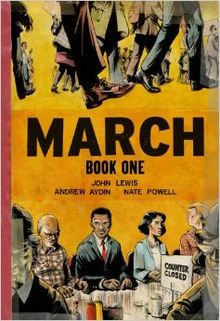Often, people tell me that they “don’t like comic books,” and while this is a totally valid opinion, I feel that people who say this may not fully grasp the scope of their declaration. As obvious as this analogy is, it’s important: saying “I don’t like comic books,” is a lot like saying “I don’t like movies,” or even “I don’t like music”; it’s entirely possible to dislike an entire medium, but it’s uncommon. What perhaps people mean when they say “I don’t like comic books” is that they don’t like the genres that are most common to the medium: superheroes, high fantasy, and sci-fi, are not for everyone. This article will attempt to help you find a comic book that you’ll enjoy.

The first step is to identify what your favorite genre is and plan accordingly. If you like realistic novels, there are plenty of books that act as real world, semi-dramatic books, like Giant Days (though some of the in-jokes border on sci-fi, like one of the characters having a phobia of hyperloops), Drama and Ghosts, which both have won awards and are popular picks, and Be Prepared was also very popular over the summer. If you like biographies, you’re in great shape: there are tons of biographies and autobiographies. The most well know of which is the outstanding Persepolis, about the life of Marjane Satrapi, and March is an autobiography of congressman and civil rights activist John Lewis. I recently read Magritte, a surrealist biography about the titular artist, and one of my favorite graphic novels is “Insanely Great,” a biography of Steve Jobs, which is excellent.
Fantasy and superhero books are of course rampant within the medium, just as rom-coms and summer blockbuster action movies are rampant in the movie industry, but their prolificness doesn’t mean that they are bad movies; the same applies to the superhero and fantasy stories that are so well represented in the comic book medium. It’s quite easy to find a good book in these genres, so only a few examples will be given here: Watchmen, by Alan Moore, delivers a cynical, and sometimes depressing view of an America with superheroes. It is, however, less of a superhero adventure, and more of an essay on free will wrapped in a murder mystery, and while I don’t personally like it, it is unarguably well written with a good story. The best fantasy graphic novel, by far, is Neil Gaiman’s Sandman, which is a fantastic series that tells several stories about the Endless, the living personifications of universal concepts, like sleep and death. There are more genres to be found in comics, and these are just the tip of the iceberg.


Another element that has to be considered is art. Not every artist appeals to every reader, and while it has never prevented me personally from reading a book, it certainly can color a reader’s enjoyment of a story. Some books spring for a more cartoonish style, like Georgia Dunn’s Breaking Cat News or Bryan Lee O’malley’s Scott Pilgrim, while others like the famous Kingdom Come lean into more realistic paintings; however, it may be beneficial for a prospective reader to take some time and decide whether or not they personally feel that the art will affect their enjoyment to a point of ruining it. Due to the visual medium of comic books, visual metaphors are easier to convey, and as such comic books lend themselves to more subtle visual details and metaphors. Due to this level of artistic freedom granted by the medium, and the prolificness of fantasy authors in the medium, lead to a heavy amount of surrealist graphics, even in non-fantasy genres.

Once you’ve finished reading your book, you’ll either have enjoyed it in full, in part, or hated it. If you enjoyed it, look for other books by the author or see if it’s a series; if you enjoyed it in part, why not go back to the helpful bookseller, and describe what elements you liked. With any luck, they’ll be able to prescribe a book even more attuned to your tastes; lastly, if you hated it, and you’re certain it was a book or genre that you would’ve enjoyed in any other medium, then maybe you really don’t like comics. It’s not an ideal outcome, not enjoying comics, but give this process a chance before you go straight from “I don’t like Batman or Captain America” to “I don’t like comic books.”
After you’ve determined you’re ideal genre and how you feel about art, the next step is to find a book. There are a few ways to go about this. You can stop by a local library, and see if any title in their graphic novel section speaks to you, or you can search online for a book, though this can be frustrating if you don’t know where to look. My suggestion is to go to your local bookshop or comic book shop, and ask around until you find a comic-book loving employee. It’s Rob Hawthorn, for those visiting the Gallery Book Shop, and describe to them what you want to read. They’ll probably have a recommendation, and likely be excited to tell you all about it.

